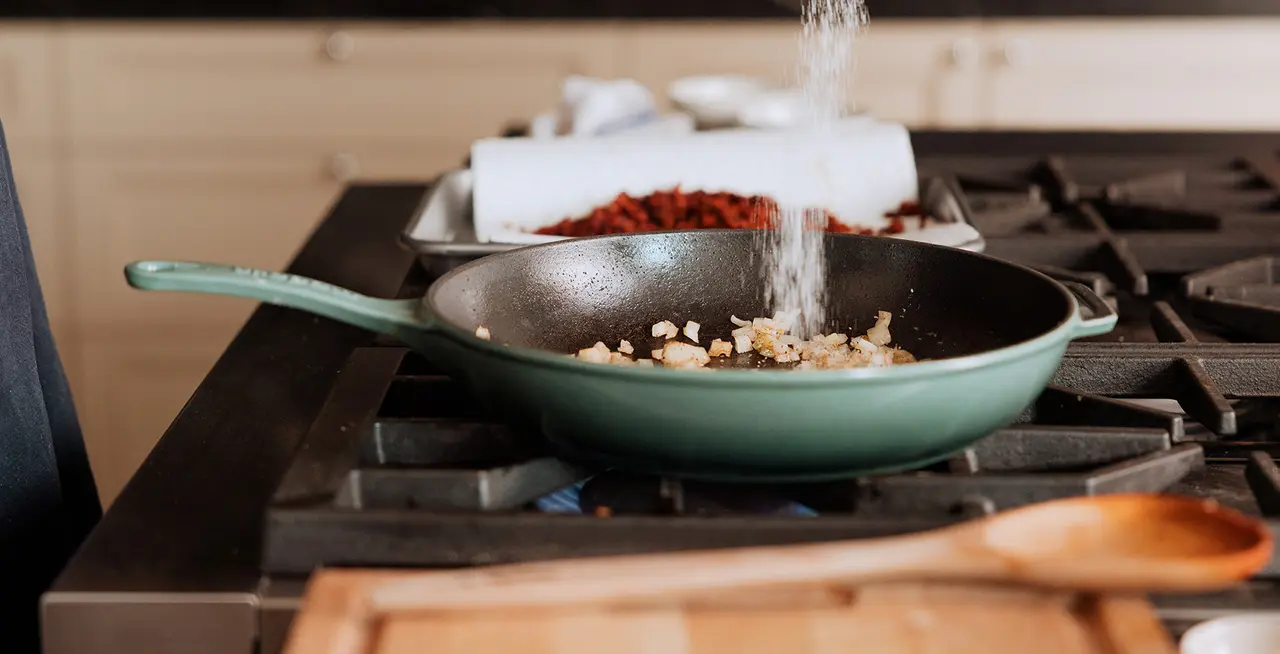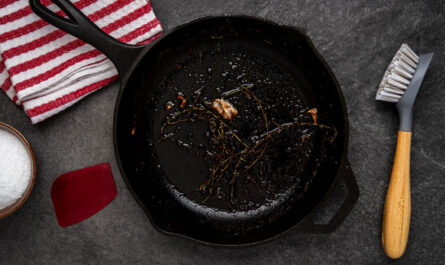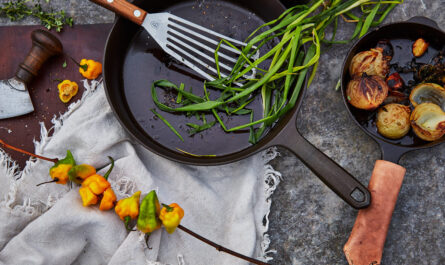Are you curious about how to cook eggs in enameled cast iron skillet the right way? It’s here! Whether you’re a sushi lover transitioning to mastering breakfast or you’re just eager to learn the art of cooking eggs, this guide will delight both your palate and cooking skills.
The process of using an enameled cast iron skillet may seem daunting initially. But with this tremendous guide, you’ll not only cook eggs efficiently but also enjoy the journey. Let’s break it down step-by-step!

What Makes Enameled Cast Iron Skillets Special?
Enameled cast iron skillets are approved by professional chefs worldwide for a reason. They combine the sturdiness of cast iron with a smooth, easy-to-clean enamel coating. Whether you’re searing steak or perfecting your egg recipe, these skillets offer remarkable performance.
Benefits of Using an Enameled Cast Iron Skillet
- Heat Retention: Even and consistent cooking.
- Durability: Lasts for decades with proper care.
- Versatility: Works with all stove types and oven-friendly.
- Non-Reactive Surface: Perfect for cooking acidic foods.
Ready to dive in? Let’s get started!
Preparing the Skillet for Cooking Eggs
Before making eggs, it’s important to properly prepare your skillet to avoid sticking, which is a common concern for beginners using enameled cast iron skillets.
1. Heat the Skillet Properly
A common mistake is placing eggs in a cold skillet. Always preheat the skillet over medium heat for 5 minutes before adding any oil or ingredients.
2. Add the Right Fat
Butter, ghee, or high-smoke-point oils like avocado oil are perfect for cooking eggs. Spread the fat evenly across the skillet before cracking the eggs.
3. Choose the Right Egg Type
Whether you prefer scrambled, sunny side up, or poached eggs, your cooking method may vary slightly. Having your eggs at room temperature will also result in better texture and cooking.
Step-by-Step Guide: Cooking Eggs
Cooking Sunny Side Up Eggs
- Preheat the skillet at medium-low heat for 5 minutes.
- Add a teaspoon of butter and wait until it foams.
- Carefully crack an egg into the skillet.
- Cover the skillet with a lid to cook the top evenly.
- After 2-3 minutes, the egg whites should be set, and the yolk should remain runny.
- Slide the egg out gently using a spatula.
Making Scrambled Eggs
- Whisk 2-3 eggs in a bowl with a pinch of salt and pepper.
- Heat the skillet and add butter or oil.
- Pour in the eggs and use a spatula to stir gently.
- Cook until reach your desired consistencysoft and fluffy or fully cooked.
Cooking Over-Easy Eggs
- Follow the steps for sunny side up eggs but flip the egg gently after 2 minutes.
- Cook on the flip side for 30 seconds for soft yolks and 1 minute for firmer yolks.
Pro Tips for Sushi Lovers and Beyond
Since you’re already keen on flavors as a sushi enthusiast, you’ll appreciate these tips:
- Use sesame oil for an Asian twist to scrambled eggs.
- Top your sunny side eggs with soy sauce or fish roe for a sushi-inspired breakfast.
- Pair your eggs with a side of avocado and sushi rice for a complete meal.
Cleaning and Maintaining Your Skillet
Proper cleaning ensures the longevity of your enameled cast iron skillet. Avoid using abrasive scrubbers or harsh soaps. Simply rinse the skillet with warm water and mild soap, and dry it immediately to avoid water stains.
Seasoning Your Skillet (If Necessary)
Although enameled cast iron doesn’t need traditional seasoning like regular cast iron, a periodic coat of oil can keep cooking surfaces smooth and non-stick.
Common Mistakes to Avoid
- Placing eggs in a cold skillet.
- Using insufficient fat for cooking.
- Overcrowding the skillet with too many eggs at once.
FAQs
Can I cook eggs without sticking in enameled cast iron?
Yes, with proper preheating and using enough fat, you can achieve non-stick results.
Do I need to season my enameled cast iron skillet?
No, seasoning isn’t required, but applying a light layer of oil occasionally can help maintain its surface.
Is enameled cast iron better than traditional cast iron?
This depends on preference. Enameled skillets are easier to clean and maintain, while traditional ones require seasoning but offer unmatched heat retention.

Relevant Resources
Looking to expand your skillet skills? Check out these recipes:
For external insights, we recommend: Cast Iron Skillet Steak Recipes
This article contains affiliate links. We may earn a commission at no extra cost to you.




